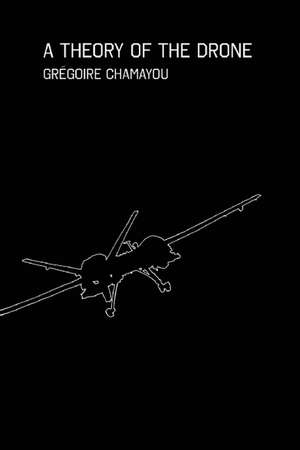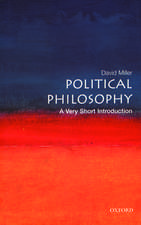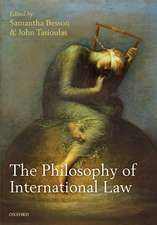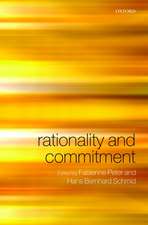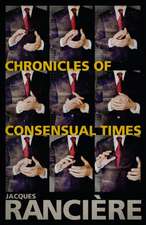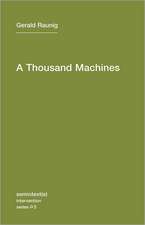A Theory of the Drone
Autor Gregoire Chamayou, Graegoire Chamayouen Limba Engleză Hardback – 5 ian 2015
Drone warfare has raised profound ethical and constitutional questions both in the halls of Congress and among the U.S. public. Not since debates over nuclear warfare has American military strategy been the subject of discussion in living rooms, classrooms, and houses of worship. Yet as this groundbreaking new work shows, the full implications of drones have barely been addressed in the recent media storm.
In a unique take on a subject that has grabbed headlines and is consuming billions of taxpayer dollars each year, philosopher Grégoire Chamayou applies the lens of philosophy to our understanding of how drones are changing our world. For the first time in history, a state has claimed the right to wage war across a mobile battlefield that potentially spans the globe. Remote-control flying weapons, he argues, take us well beyond even George W. Bush’s justification for the war on terror.
What we are seeing is a fundamental transformation of the laws of war that have defined military conflict as between combatants. As more and more drones are launched into battle, war now has the potential to transform into a realm of secretive, targeted assassinations of individuals—beyond the view and control not only of potential enemies but also of citizens of democracies themselves. Far more than a simple technology, Chamayou shows, drones are profoundly influencing what it means for a democracy to wage war. A Theory of the Drone will be essential reading for all who care about this important question.
In a unique take on a subject that has grabbed headlines and is consuming billions of taxpayer dollars each year, philosopher Grégoire Chamayou applies the lens of philosophy to our understanding of how drones are changing our world. For the first time in history, a state has claimed the right to wage war across a mobile battlefield that potentially spans the globe. Remote-control flying weapons, he argues, take us well beyond even George W. Bush’s justification for the war on terror.
What we are seeing is a fundamental transformation of the laws of war that have defined military conflict as between combatants. As more and more drones are launched into battle, war now has the potential to transform into a realm of secretive, targeted assassinations of individuals—beyond the view and control not only of potential enemies but also of citizens of democracies themselves. Far more than a simple technology, Chamayou shows, drones are profoundly influencing what it means for a democracy to wage war. A Theory of the Drone will be essential reading for all who care about this important question.
Preț: 207.21 lei
Nou
Puncte Express: 311
Preț estimativ în valută:
39.66€ • 40.87$ • 33.48£
39.66€ • 40.87$ • 33.48£
Carte tipărită la comandă
Livrare economică 03-17 martie
Preluare comenzi: 021 569.72.76
Specificații
ISBN-13: 9781595589750
ISBN-10: 1595589759
Pagini: 304
Dimensiuni: 142 x 211 x 25 mm
Greutate: 0.43 kg
Editura: New Press
ISBN-10: 1595589759
Pagini: 304
Dimensiuni: 142 x 211 x 25 mm
Greutate: 0.43 kg
Editura: New Press
Recenzii
Praise for Manhunts, Chamayou's previous book:
"Manhunts is an unusual and stimulating essay. . . . The strength of the book lies in its refusal to treat manhunting as a metaphor. Chamayou instead focuses on the concrete violence of predation, tracking, banishment, captivity, confinement, and the murderousness that goes along with them."
—Jean Berard, Books and Ideas
"'Man, wolf to man? Brecht asked the question, Chamayou provides a brilliant and terrifying answer."
—Mike Davis, author of City of Quartz and Planet of Slums
"From manhunting for sport in the Occident to the global search for illegal aliens in the twenty-first century, this book offers a history of humans preying on other human beings. Applying the rubric of hunting to contemporary debates about illegal migrants, Chamayou shows that the supposedly newest hunt refreshes an old motif. A provocative take on a topic of great currency."
—Jimmy Casas Klausen, University of Wisconsin-Madison
"In Chamayou’s razor-sharp telling, drones fundamentally transform the psychic, moral, and physical space and art of killing. But it is his theory of the drone that is even more chilling. It demands that we consider the emergence of a new ethical and political norm of war that is neither war as we know it—nor peace. The ‘principle of immunity for the imperial combatant’ rests on a twisted logic: On the one hand is the achieved capacity of the drone operative (one of many newly installed masters of ‘lethal surveillance’) to move throughout a day between killing fields and coffee breaks, between combat zones and home. On the other hand is the enlisting of a citizenry to accept the ‘moral obligation’ to kill. In this compelling analysis, Amnesty International’s classing of drone strikes as war crimes would be only part of the story. Chamayou’s critical point is that drones alter the very terrain and logic of who deserves to die and implicates us all."
—Ann Stoler, Willy Brandt Distinguished University Professor of Anthropology, New School for Social Research
"A virtuoso performance: a wholly original, wide-ranging, and provocative critique of targeted killing from remote platforms that switches from the ‘big picture’ to the detailed view with consummate skill and successfully calls into question many of the central claims advanced by the proponents of later modern war."
—Derek Gregory, Peter Wall Distinguished Professor, University of British Columbia
"Chamayou is brilliant. He jumps breezily from Freud and Camus to Marx and Mao, from Israeli and ancient Athenian generals to Russian researchers and Chinese strategists. If you stick with the wild ride, you’ll find his arguments are breathtakingly profound and the translation is superb. Chamayou is masterful at unmasking just how ethically bankrupt and dangerous it is to kill people by remote control."
—Medea Benjamin, cofounder of CODEPINK and author of Drone Warfare
"Manhunts is an unusual and stimulating essay. . . . The strength of the book lies in its refusal to treat manhunting as a metaphor. Chamayou instead focuses on the concrete violence of predation, tracking, banishment, captivity, confinement, and the murderousness that goes along with them."
—Jean Berard, Books and Ideas
"'Man, wolf to man? Brecht asked the question, Chamayou provides a brilliant and terrifying answer."
—Mike Davis, author of City of Quartz and Planet of Slums
"From manhunting for sport in the Occident to the global search for illegal aliens in the twenty-first century, this book offers a history of humans preying on other human beings. Applying the rubric of hunting to contemporary debates about illegal migrants, Chamayou shows that the supposedly newest hunt refreshes an old motif. A provocative take on a topic of great currency."
—Jimmy Casas Klausen, University of Wisconsin-Madison
"In Chamayou’s razor-sharp telling, drones fundamentally transform the psychic, moral, and physical space and art of killing. But it is his theory of the drone that is even more chilling. It demands that we consider the emergence of a new ethical and political norm of war that is neither war as we know it—nor peace. The ‘principle of immunity for the imperial combatant’ rests on a twisted logic: On the one hand is the achieved capacity of the drone operative (one of many newly installed masters of ‘lethal surveillance’) to move throughout a day between killing fields and coffee breaks, between combat zones and home. On the other hand is the enlisting of a citizenry to accept the ‘moral obligation’ to kill. In this compelling analysis, Amnesty International’s classing of drone strikes as war crimes would be only part of the story. Chamayou’s critical point is that drones alter the very terrain and logic of who deserves to die and implicates us all."
—Ann Stoler, Willy Brandt Distinguished University Professor of Anthropology, New School for Social Research
"A virtuoso performance: a wholly original, wide-ranging, and provocative critique of targeted killing from remote platforms that switches from the ‘big picture’ to the detailed view with consummate skill and successfully calls into question many of the central claims advanced by the proponents of later modern war."
—Derek Gregory, Peter Wall Distinguished Professor, University of British Columbia
"Chamayou is brilliant. He jumps breezily from Freud and Camus to Marx and Mao, from Israeli and ancient Athenian generals to Russian researchers and Chinese strategists. If you stick with the wild ride, you’ll find his arguments are breathtakingly profound and the translation is superb. Chamayou is masterful at unmasking just how ethically bankrupt and dangerous it is to kill people by remote control."
—Medea Benjamin, cofounder of CODEPINK and author of Drone Warfare
Notă biografică
Grégoire Chamayou is a research scholar in philosophy at the Centre National de la Recherche Scientifique in Paris. The author of Manhunts: A Philosophical History, he lives in Paris. Janet Lloyd has translated more than seventy books from the French by authors such as Jean-Pierre Vernant, Marcel Detienne, and Philippe Descola.
